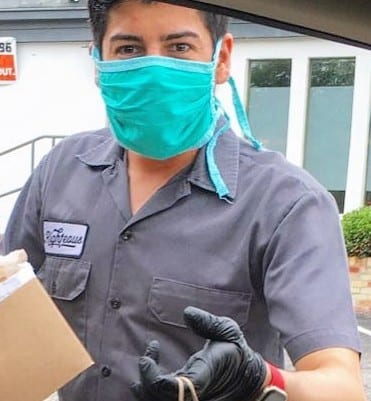Some restaurant dining rooms are choosing to delay reopening. Texas Governor Greg Abbott announced two weeks ago that restaurants and other businesses could start to reopen at a greatly diminished capacity. Though some eateries have chosen to welcome back guests, many others have decided to remain closed. Most restaurants still offer curbside pickup and delivery options.
Many want to know what is motivating a restaurant owner to turn down customers (read: money) during a time when all businesses need an infusion of cash. Several restaurateurs have gone on the record citing a variety of reasons. Spokespeople for a few larger chains have stated that the margins aren’t worth the health risk. Other smaller independent restaurant spokespeople have said they’d actually lose money with the extra staff and utilities they’d have to pay. Almost every restaurant owner and representative has chimed in with their biggest concern: It’s not safe yet.

Lancarte: “It’s sad to see our dining room just so quiet.”
Chef Lanny Lancarte of Righteous Foods in Fort Worth said that seeing guests is what he misses most about the pre-COVID-19 days.
“It’s sad to see our dining room just so quiet,” he said.
Like many area eateries, the upscale health food hot spot pivoted to curbside pickup and delivery. The dining room at Righteous Foods will delay reopening until he feels it’s safe, he said. He added that the to-go business has been steady, and customers have been very supportive.
“We haven’t stopped working since this crisis started,” he said. “I think we’re going in the right direction, so whenever this thing is over, we’ll still be here on the other side.”
The Economics Are a Factor
In a CNBC interview, Benjamin Berg, the CEO of the Houston-based Berg Hospitality Group, echoed Lancarte’s safety concerns. He added that reopening his restaurants, which includes Fort Worth’s B&B Butchers, doesn’t make economic sense.
“For us, the larger stores that are 9,000 square feet and bigger, the cost of getting those stores going doesn’t really make sense at a 25 percent capacity,” he said.
“We decided we couldn’t do it safely,” he continued. “I think it’s a struggle. People are trying to figure out how to get employees back. There are people ready to get out and some who are very cautious.”
Berg added that B&B’s to-go business has skyrocketed, as has the eatery’s in-house butcher’s shop, which has tripled in customers. Many food service businesses are adding shopping components, as guests would rather go in person to as few places as possible.
Restaurants Will Delay Reopening All Over the Country
For Texas restaurants to re-open, they must follow state safety guidelines. A few of these new rules include keeping tables six feet apart, having no more than six people at a table, and all staff wearing masks and gloves at all times.

A Righteous Foods employee delivers a curbside pickup order.
All over the country in states that have reopened businesses, restaurants are choosing to stay shuttered. In Atlanta, more than 50 restaurants banded together and agreed to stay closed, but will still offer to-go food.
Restaurants May Change Their Models
Berg said that some of the smaller restaurants in his company’s portfolio might open soon. He also believes that the curbside pickup and restaurant to-go services that have generated much-needed income that will be a permanent part of his businesses going forward.
“We have to be positive but we’re really cautious,” he said. “I feel it will come back. It’s pushed us all to get involved in to-go and other avenues of revenue. We’ll be more prepared.”





